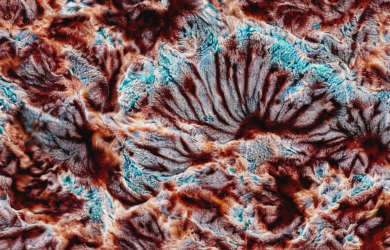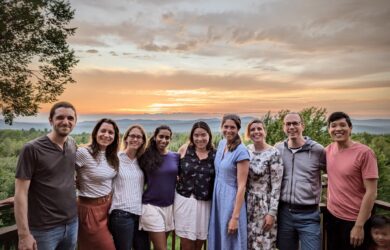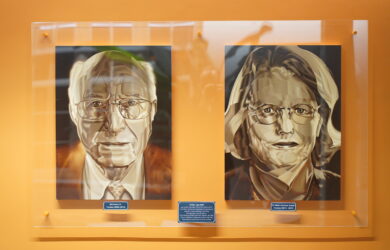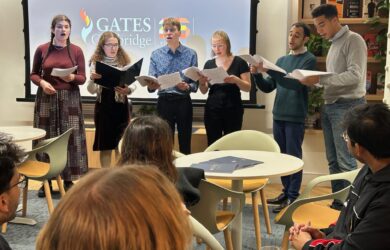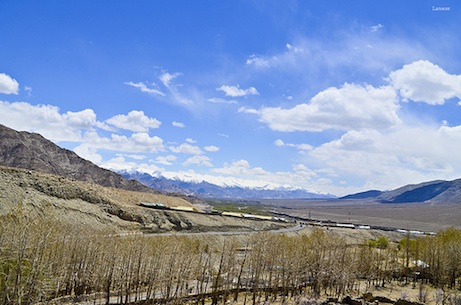
Yama Dixit is completing her PhD looking at whether climate change may have caused the collapse of the Harappan civilisation.
Did the Harappan civilisation, the largest ancient civilisation in the world, die out after an extreme climate event?
Gates Cambridge Scholar Yama Dixit [2009] has been conducting research on lake sediments from three lakes in north west India to see whether climate change played a role.
“What we want to do is to understand if there are any lessons for today in how people do or don’t adapt to extreme weather. Our meteorology records only go back 100 years. Climate events work on much larger time scales which is why we need to study paleo-climate records,” says Yama.
The research has presented practical problems, for instance, one lake in the Thar Desert did not have many of the fossil shell deposits typically used by analysts to reconstruct climate change. Instead Yama’s supervisor, Professor David Hodell, suggested using gypsum as a proxy and the researchers found that it worked. They are still developing the use of this proxy, but it could prove significant for other areas where there are not many fossil shell deposits.
The findings from the research have been accepted from publication in a peer-reviewed journal.
Yama, who is just finishing her PhD in Earth Sciences, hopes to continue her research at postdoctoral level, but she is also driven by a passion to teach.
Teaching
Yama was born in Lucknow to an academic family.
She has two sisters and a brother who is eight years younger than her. “I have been teaching him and later his friends since I was 10,” she says. “I set up a small classroom and taught him writing and maths and only stopped when I went to university.”
Teaching her brother ignited a passion in Yama for teaching and when she went to the University of Delhi to do her undergraduate degree she earned money teaching private classes in the evenings.
She noticed too that there were a lot of street kids in the market near where she was living. “They would come to the market to sell balloons and they reminded me of my brother,” she says.
She decided to see if she could offer them some free education. Along with some friends, she contacted the National Social Service Scheme to ask if she could use their name to set up classes. Initially she used her own money to pay for school materials. She asked friends for places she could hold the classes.
Although the children, aged six to 14, were keen to learn, Yama had to overcome the concerns of their parents that if they were taking classes in the evenings they would be losing the best hours for earning money from selling balloons. “They were not against the classes. It was just practical concerns about how they would eat if the children didn’t earn enough money,” she says. She offered the children some money to make up the shortfall.
After noting her efforts and success, Yama’s college authorities began to sponsor the classes and provide college premises for them.
Yama’s did an honours degree in chemistry, but found the long hours in the lab difficult. “I’m an outdoors person,” she says. So she looked for courses where her chemistry knowledge could be applied in the environment. The Jawaharwlal Nehru University offered one of the best masters courses in environmental sciences in India and she was one of only 10 students accepted.
The JNU is in the southern part of Delhi and the campus is closed so Yama had to give up her teaching. Instead, she poured herself into environmental activism. She became leading member of the students’ union, representing her school and organised campus-wide campaigns, including anti-smoking and Earth Week campaigns. She was also involved in a student strike over school resources.
Her masters course was broad-ranging, covering everything from remote sensing to environmental toxicology. During the summer of her first year she won a scholarship to do an internship at the National Institution of Oceanography in Goa to study climate change. Soon after she had to decide what the focus of her masters project would be. She chose to study the geochemistry of river sediment samples in the Brahmaputra river in Assam and how these had changed over time.
It was her first experience of doing a chemical analysis of natural samples and she was fascinated by the possibilities. She applied for a junior research fellowship [JRF] to continue her research. It involved sitting a national exam with the top student being awarded the best package of money and lab facilities. Yama was among the top five students awarded this fellowship. She started the fellowship research while also looking at the possibility of pursuing a PhD outside of India if she could find some funding.
Masters
The used the JRF for her two-year MPhil degree, but she did it in a year and four months and used the rest of the fellowship money for English exams. She spotted a project based in India in collaboration with the Indian Institute of Technology in Kanpur on the University of Cambridge’s Earth Science website, applied for it and got an offer to do a PhD at Cambridge.
Because she broke her leg just before she was due to come to the UK she had to delay leaving. She used the time to collect sediments for her PhD and do preliminary research at IIT, Kanpur, which is near her home town of Lucknow.
Her time in Cambridge didn’t begin well. She arrived with no proper winter clothes; she had no internet and she had missed the Gates Cambridge orientation so did not know any other students. She felt very homesick, but worked hard and returned home in December to fetch more samples.
However, when the samples were subjected to radio carbon dating it was found that they were all mixed up, with the topmost sediment being the oldest, rendering the samples unfit for paleo-climate research. Yama was sent back to India to find out what had happened and why the samples had been reworked. She discovered that there had been a lot of mining in the area so the ground had all been dug over and refilled. “It was not a suitable place for paleo-climate study,” she says. So she had to locate another site.
She found an area in the Indus Valley region in north west India with three lakes where she could use lake sediments to see how the climate and specifically the Indian summer monsoon had changed over the last 10,000 years.
This was to form the basis of her PhD research. After she completes her dissertation she hopes to do more post-doctoral work in the same field, but she is torn between her research and her passion for teaching. Her long-term aim is to set up a school for street children. Her mother runs a school for poor children in Lucknow. She is hoping that through the Gates Cambridge scholarship she can find like-minded people who will help her fulfil this dream.
Picture credit: Lansca and Creative Commons.








